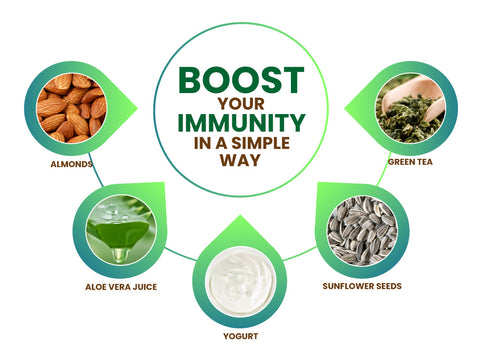
Boost Your Immunity In A Simple Way
There are a plethora of vitamins and items in the grocery store that promises to strengthen your immune system, but to boost your immunity, you need to buy an accurate product with up-to-date information. However, while it may appear to be a no-brainer, increasing your immune system is far more difficult than you might imagine — and with good cause.
Your immune system is extremely intricate. It must be powerful and smart enough to combat a wide range of illnesses and infections, but not so powerful that it overreacts inappropriately, leading to allergies and other autoimmune disorders. Your immune system is tightly controlled by a multitude of inputs to work in such a delicate equilibrium. Despite its complexity, you can focus on daily lifestyle practices to provide your immune system with the tools it needs to combat a virus or ailment.
Boost Your Immunity with These Healthy Foods
You may be wondering how to help your body battle infections if you want to improve your immunological health.
While improving your immunity is easier said than done, making a few dietary and lifestyle modifications can help you enhance your body's natural defenses and fight disease-causing germs.

1. Almonds
Vitamin E is often overshadowed by vitamin C when it comes to preventing and treating colds. Almonds' potent antioxidant, on the other hand, is essential for a healthy immune system. It's a fat-soluble vitamin, which means it needs fat to be adequately absorbed. Almonds, for example, are high in vitamin E and contain healthy fats.
Adults only require about 15 mg of vitamin E each day. A half-cup portion of almonds (about 46 whole, shelled almonds) offers approximately 100 percent of the required daily intake.
2. Aloe Vera Juice
Aloe vera juice contains fiber, minerals, and antioxidants that help the immune system function properly. Excessive inflammation in the body can lead to immune system issues as well as illnesses like asthma, eczema, and Ulcerative colitis. Aloe vera juice, for example, can assist in reorganizing the immune response and reduce the inflammatory cascade, preventing many disorders thus working as an immunity booster juice.
3. Yogurt
Plain yogurts are preferable to those that are flavored and laden with sugar. Instead, you can sweeten plain yogurt with fresh fruits and a dab of honey. Yogurt can also be a good source of vitamin D, so look for types fortified types.
Vitamin D is thought to improve our body's natural defenses against illnesses by helping to control the immune system.
4. Sunflower seeds
Sunflower seeds are high in phosphorus, magnesium, and vitamins B-6 and E, among other minerals. Vitamin E is necessary for immune system regulation and maintenance. Sunflower seeds have a lot of selenium in them. One ounce contains about half of the selenium that the average adult needs daily. Much research, largely on animals, has looked into its ability to fight viral illnesses like swine flu.
5. Green tea
Flavonoids, a type of antioxidant, are abundant in green and tea. Green tea's levels of epigallocatechin gallate (EGCG), another potent antioxidant, are where it shines.
EGCG has been shown in trials to improve immunological function. Much of the EGCG in black tea is destroyed during the fermenting process. Green tea, on the other hand, is steamed rather than fermented, preserving the EGCG.
5 General Ways to Boost Immune System Through Lifestyle

1. Maintain a Balanced Diet
A good diet, like other things in your body, is essential for a strong immune system. This involves getting lots of fruits, vegetables, legumes, whole grains, lean protein, and healthy fats into your diet.
A balanced diet can help ensure that you acquire enough of the micronutrients that contribute to immune system maintenance like chicken, salmon, tuna, bananas, green vegetables, and potatoes all contain vitamin B6. Citrus fruits, such as oranges and strawberries, as well as tomatoes, broccoli, and spinach, contain vitamin C.
Because experts believe that your body absorbs vitamins more efficiently from food rather than supplementation, eating a well-balanced diet is the greatest method to enhance your immune system.
2. Exercise regularly
Physical activity isn't just for toning muscles and de-stressing; it's also essential for staying healthy and sustaining a strong immune system.
Exercise can help your immune system by improving your overall circulation, making it simpler for immune cells and other infection-fighting compounds to move around your body.
Studies have shown that even 30 minutes of exercise per day might help your immune system function better. This means that being active and exercising regularly is critical.
3. Hydrate yourself enough
Water serves a variety of functions in the body, including immune system assistance. Lymph, a fluid in your circulatory system that transports essential infection-fighting immune cells across your body, is mostly water. Dehydration causes lymph to travel more slowly, which can contribute to immune system problems.
Even if you aren't exercising or sweating, you are continuously losing water through your breath, urine, and bowel motions. Make sure you're replenishing the water you lose. Water can be utilized to strengthen your immune system, which starts with drinking gallons of water.
4. Get enough sleep
Even if you don't realize it, your body is busy when you're sleeping. Important infection-fighting chemicals are produced while you nap.
According to studies, people who don't get enough sleep are more likely to get sick after being exposed to viruses like the common cold. It's critical to understand how much sleep you should receive every night, as well as what steps to take if your sleep is failing, Offering your immune system the best chance of fighting infection and sickness.
5. Reduce stress levels.
It's critical to understand how stress impacts your health, especially the influence it has on your immune system, whether it comes on suddenly or gradually. When your body is under stress, especially chronic stress that is frequent and long-lasting, it responds by triggering a stress response. As a result of this stress response, your immune system is suppressed, increasing your risk of infection or sickness.
Everyone's stress levels and coping mechanisms are unique. It's critical to understand how to recognize stress because of the negative impact it can have on your health. You should also become familiar with the practices that assist you in alleviating stress, whether it's deep relaxation, meditation, or exercise.
Conclusion
Today, you may enhance your immune system by making a few lifestyle and nutritional modifications.
Reduce your Sugar consumption, remain hydrated, exercise regularly, get enough sleep, and manage your stress levels are just a few of them.


